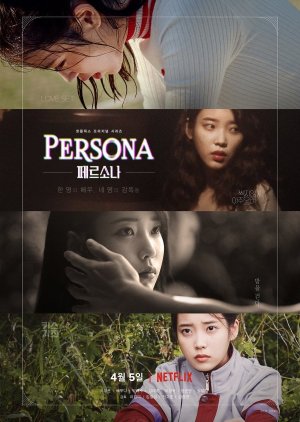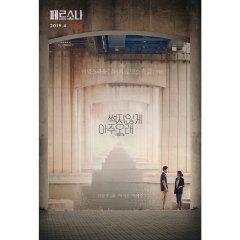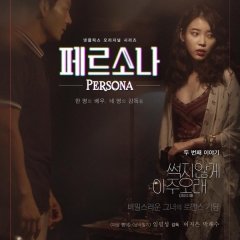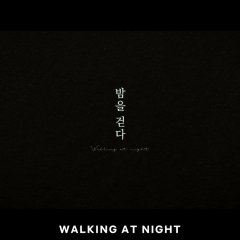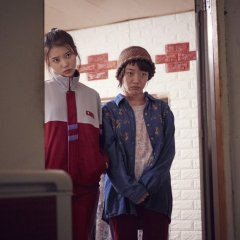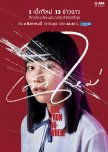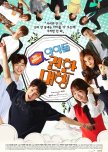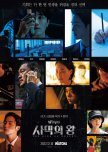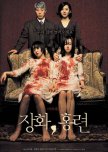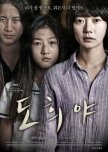 IU joins Bae Doo Na, Song Kang Ho, and Kang Dong Won in upcoming film "Broker"
IU joins Bae Doo Na, Song Kang Ho, and Kang Dong Won in upcoming film "Broker" Persona é uma série de antologia que contém 4 partes diferentes. Cada parte dirigida por diretores diferentes conta histórias separadas, estreladas pela IU como protagonistas. "Conjunto do Amor", dirigido por Lee Kyung Mi, segue uma intensa partida de tênis entre a IU e Doo Na. As apostas da partida são altas para ambas as mulheres. "Collector", dirigido por Im Pil Sung, conta a história de uma mulher sedutora, Eun, que ama seduzir os homens e um homem disposto a fazer qualquer coisa por seu amor. "Kiss Burn", dirigido por Jeon Go Woon, retrata as muitas tentativas de vingança feitas por duas meninas da escola, Han Na e Hye Bok, sobre o irracional pai de Hye Bok. Filmado em preto e branco, "Walking at Night", dirigido por Kim Jong Kwan, relata a triste história de dois ex-amantes que vão passear no sonho do homem, lembrando de seu amor e dizendo coisas que não têm a chance de fazer na vida real. (Fonte: MyDramaList) Editar Tradução
- Português (Brasil)
- 한국어
- 中文(台灣)
- Arabic
- Título original: 페르소나
- Também conhecido como: Love Set , Collector , Kiss Burn , Walking at Night
- Roteirista e Diretor: Im Pil Sung, Kim Jong Kwan, Lee Kyung Mi, Jeon Go Woon
- Gêneros: Thriller, Romance, Drama
Onde assistir Persona
Elenco e Créditos
- IU Papel Principal
- Bae Doo Na{Love Set} Doo Na (Ep. 1)Papel Secundário
- Kim Tae Hoon{Love Set} Tae Hoon [IU's Father] (Ep. 1)Papel Secundário
- Pierce Conran{Love Set} [IU's boyfriend] (Ep. 1)Papel Secundário
- Park Hae Soo{Collector} Baek Jeong U [Eun's Boyfriend] (Ep. 2)Papel Secundário
- Bae So Young{Collector} Ji Soo (Ep. 2)Papel Secundário
Resenhas

1) Love Set - Two women get entangled in an intense battle of wills on the tennis court and try to pummel one another, but the stakes are higher than they realise.
Review: I don’t know if it was the plot in general or just my inability to comprehend the message being conveyed but the end left me kind of confused. I’m trying to find a deeper meaning but can’t seem to come to a conclusion. Perhaps there isn’t a deeper meaning behind the plot and what happened at the end, just happened. Other than that, the acting was great.
2) Collector - A befuddled man wants to know why a woman he’s seeing disappeared to go travelling with her male friends - but she demands a gesture of his true love.
Review: This was pretty creepy, a stark contrast to the previous one but I really enjoyed it. This might be my favourite out of all the short films. The plot was different and gripping, the acting was superb and IU is so pretty!
3) Kiss burn - As she listens to her friend’s tale about how the marks on her face are from making out with a guy, the two of them inadvertently cause a mishap.
Review: This one was more light hearted than the other two and even had me chuckling at the end.
4) Walking at Night - A man and a woman take an evening stroll together and ruminate about dreams and their various past moments spent together - as well as death.
Review: I enjoyed the noir style cinematography which added to the eeriness of the film. However, I found myself getting a bit bored halfway through. But the actors again did an amazing job.

Surreal Food For Thought, Though Some Storylines Were More Striking Than Others...
Netflix’s Persona is a collection of four South Korean short films, all starring Lee Ji-Eun ( IU). Directed by acclaimed Korean filmmakers Lee Kyoung Mi, Yim Pil Sung, Jeon Go Woon and Kim Jong Kwan and partially produced by record- producer Yoon Jong Shin, each episode was inspired from elements of IU’s own personal life and career.Although there is the initial thought of a vanity project for IU being the main star in each episode, there’s no denying that IU is a talented and versatile actress. Even in storylines which may deliver impactful plot revelations for viewers, IU seemed to add a necessary fair and uniqueness to stepping into the roles of her varied and different ‘’personas’’ in each storyline. Yet due to each episode being vividly different with a new director, story and theme, it is probably easier to assess each episode as a standalone piece before moving on to the overall interpretations of the ensemble.
‘’ Love Set”- Starting off the collection begins with director Lee Kyoung Mi’s strange and surreal storyline on a tennis court. In this fictionalised world, actress Bae Doona is ready to marry IU’s father. Naturally, IU is contemptuous about the matrimony and decides to issue a tennis battle with Bae Doona on the tennis court.
Using minimal dialogue, filmmaker Lee Kyoung Mi turns 19 minutes, into an eccentric , humorous and over-the-top battle of grunts and tennis balls being smacked back and forth in an odd competition of love, rivalry and hormones with a strangely sexual undertone . It is one of the most peculiar shorts in the series with an oddly anticlimactic and abrupt ending. Rather than viewers understanding the reason behind IU’s disagreement, passion and drive to stopping this rivalry, the undeniable relief of not having watch IU’s and Bae Doona’s unexplained and peculiar tennis match instead overcomes the watcher’s mind with just one thought. “ That was weird.”
“ Collector” - Yim Pil Sung‘s film and the second piece of the “ Persona” collection transitions into notably darker territory, with its focus upon an older man named Baek Jeong-u on a date with a notably younger woman, played by IU. As the date goes on, Baek becomes increasingly irked as the younger woman teases him and appears disconnected from their conversion. Pil Sung’s scenes then present the evident discomfort of Baek in a lonely, empty room as he attempts to prepare himself either to relax or to literally be killed by a woman’s subtle emotional jabs. Notably having a more prominent overarching storyline than “ Love Set”, “ Collector” initialises the reminiscent traits of the promiscuous Kumiho ( a nine- tailed fox in Korean mythology) as well as an intriguing critique upon stereotypes of women in South-Korean society. ( Which naturally IU herself has also been subject to in the wider media.) IU’s character is undeniably playful and manipulative with Baek, however, she never goes out of her way to seduce him as Baek practically throws himself at her feet. This subversion reversal of gender dynamics offered both the literal and metaphorical stereotype of the coquette’s ways of playing with a man’s heart. Still oddly surreal and taking time to interpret , the storyline was certainly subversive in this short piece .
“ Kiss Burn”-A clear critique to the oppressive natural of youths in rural Korea, the third entry of “ Persona” brings Jeon Go Woon’s focus on arguably the most ‘’lighthearted’’ short of the ensemble. IU plays a conniving schoolgirl named Han-na, who visits the rural house of her friend Hye-bok. Hye-bok’s father, a forest fire lookout, is strict with Hye-bok and greatly dislikes Han-na under the impression she’s a bad influence. Out of anger and revenge, Han-na helps Hye-bok pull various pranks, but naively ignites other unintended consequences. Go Woon’s filming- style is notably the most basic and simplistic out of his counterpart directors, yet the usage of screenwriting through approachable storytelling, pacing and jokes makes the story easier to follow than the last two predecessors of the collection. The one flaw of this piece is that whilst the storyline was easier to follow behind the reasoning of Ha-na and Hye-Bok’s vengeance, it is harder to truly define what made their characters original or intriguing.
“ Walking at Night”- Persona concludes with Kim Jong Kwan’s monochrome-filmed short tackling the most poignant segment of the entire ensemble. IU plays a deceased woman who appears in her former boyfriend’s dream. In that dream, the couple takes a walk at night, reminiscing about bygones and musing about the nature of love, life, and death.The scenery is kept simplistic with a simple interaction of walking and a succinct soundtrack . The only true uncertainty which may strike viewers as harrowing can be seen through the mysterious figure as the two characters walk into the night- something symbolising the unknown just behind them. Out of all the shorts, this final piece tackle arguably the most heartfelt and profound themes of the series with focuses upon existentialism as well as the social issue of suicide in South-Korean society, giving the piece a sense of deeper meaning and reflection for viewers.
Ultimately, IU is the main star of each storyline and plays each one of her roles with diverse brilliance and talent. Whilst each episode has its own flair, there’s no doubt that some shorts were a lot better than others. “Walking At Night” offered arguably the most touching, harrowing and profound themes of the shorts in literal black and white , closely followed by the surreal, yet social critique of women’s roles in ‘ Collector’. ‘ Kiss Burn’ pointed out an undeniably ironic and twisted ending, but lacked intrinsic character depth, whilst arguably the weakest of the series was ‘ Love Set’. Attempting to weave in too many sociocultural metaphors and messages into one short, the storyline was weakened by its lacking sense of purpose, context and ending.
Overall, the ‘ Persona’ collection was fairly entertaining- IU is a talented actress and the artistic licensing by different directors gave us a fresh feel to each episode. On the other hand, as a collection, the weaker storylines of the piece ultimately complicated episodes and character depth - ultimately not a bad show to binge watch out of boredom, but probably not worth committing time towards if you’re expecting to watch an ensemble of well-written and profound collection of shorts.

